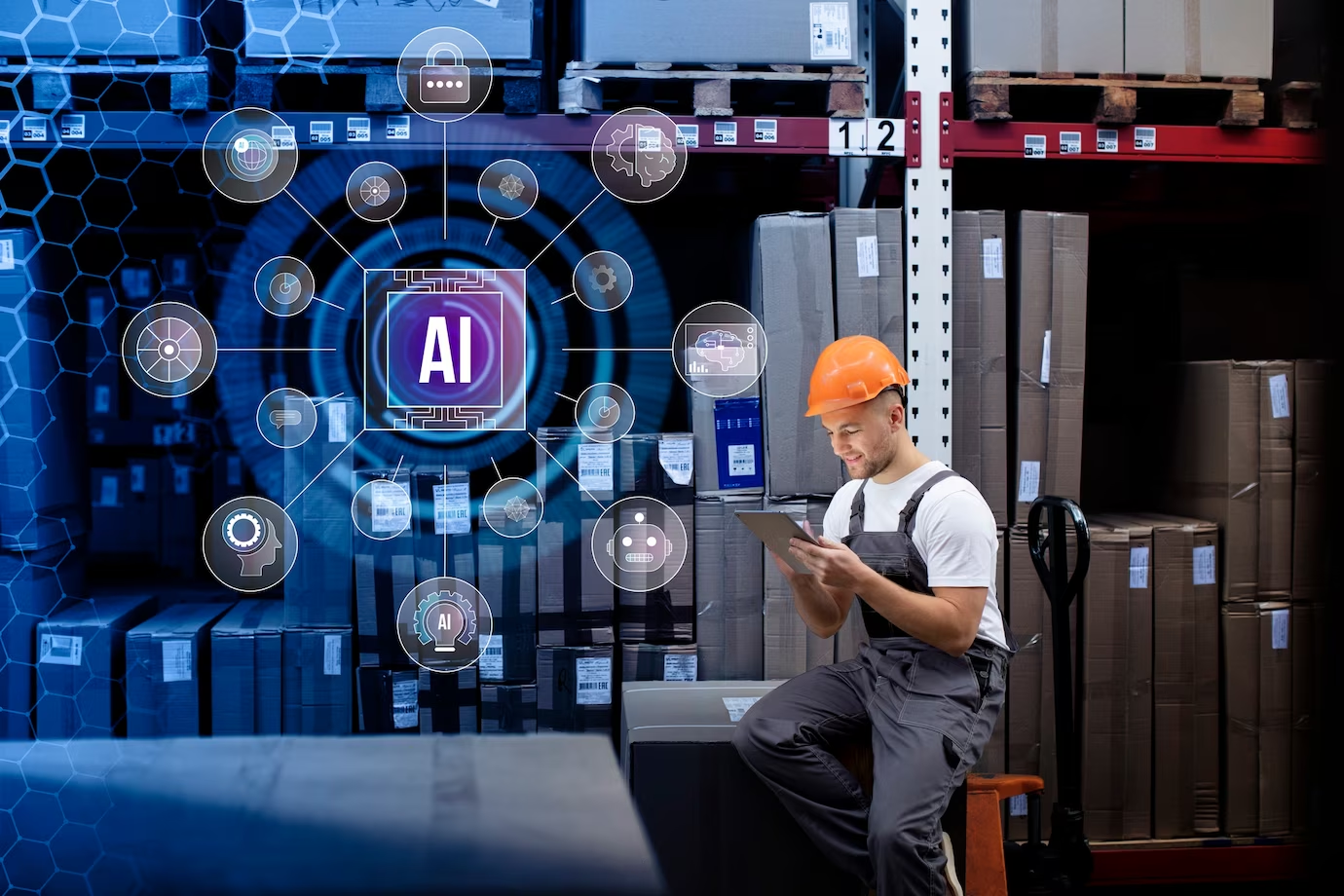In today’s dynamic and fast-paced business world, where consumer choices, market dynamics, and global disruptions change almost daily, there is increasing connectivity in the supply chain, i.e., among producers, service providers, and consumers. Therefore, in the scenario, the intervention of artificial intelligence AI in supply chain management to incorporate automation to improve efficiency, agility, and innovation is much needful.
As organizations continue to meet the needs of a vastly interconnected and competitive world, AI technologies offer tremendous opportunities to optimize supply chain operations, streamline logistics, and boost the decision-making capabilities of management. From using predictive analysis to estimating consumer demands in the future to robotic automation, the transformative potential of AI in supply chain management is reshaping the conventional approaches and revolutionizing how businesses navigate challenges and take advantage of opportunities.
In this blog, let’s delve deep into the multifaceted role of AI in supply chain management, exploring its applications across various industries, the tangible benefits it brings to businesses, and the broader insights of future transformations it can bring on a global scale.
What is a Supply Chain Management? How does it work?
Ever wondered how the grocery you shopped for online reached you on the estimated date and time? The imagination you are making right now is the supply chain.
Supply chain management refers to handling the entire production flow of goods, from the raw produce to supplying the ready product to the customer. Any business offering services hires a network of suppliers to get the product delivered from the producer to the organization, which finally lands it in the hands of consumers.
How does Supply Chain Management work?
There are five key levels involved in the management of the supply chain:
Planning: It refers to planning and managing all the products required to meet demands in the market. Effective planning should add value to the service and align with the company’s goals.
Sourcing: Finding sources to gather raw components needed for production, which involves placing orders, receiving orders, managing inventories, and keeping up with supplier payments.
Manufacturing: It refers to the processes that are needed to create the product, like preparing the raw material, manufacturing the product, testing quality, and packaging for deliveries.
Delivering: Scheduling and shipping orders for customers, dispatching loads along with invoices, and receiving payments.
Returning: Establish a system to manage returns, recalls, or surplus merchandise.
Why is Supply Chain Management important?
The better the supply chain management, the lower the utilization of crucial resources like cost, time, and reduced waste production. Today, industry and customer expectations set a mark where there is just-in-time delivery, and retailers automatically signal the producers to supply replenishment orders to restock their products. However, a lot of improvements have yet to happen to fill holes in the ongoing processes. Below are the three ongoing scenarios where a well-managed supply chain can add value to the supply chain cycle.
Identifying Areas of Improvement:
With effective management and data analysis, potential problem areas can be identified and worked on; for instance, the number of products being demanded by customers may be more than the number of products being delivered by the manufacturer. Such loopholes in the supply chain would lead to poor customer service. Here, by using proper data analysis tools, manufacturers would be informed about the low stock in advance to avoid shortages.
Price Optimization:
Prices of products increase and decrease based on the demand. For example, seasonal products with shorter lifespans are put on sale at hefty discounts to avoid loss. Moreover, many organizations like airlines and hotels use certain data analysis software that predicts higher demands and increases prices to maximize profits. Therefore, by adopting such effective tools, revenue generation can be boosted.
Enhanced Inventory Allocation with ATP (Available to Promise):
“Available to Promise” refers to the quantity of products that the producer promises to deliver at the specified date and time, considering various factors like production capacity, current inventory levels, etc. By adopting effective technologies and analytical tools, there can be automated scheduling of operations, and resources can be allocated dynamically.
AI in Supply Chain

COVID-19 and subsequent disruptions really disturbed the supply chain and created a void for smart systems that could help organizations tackle these uncertainties. Moreover, as artificial intelligence spread like fire in various domains like healthcare, education, teleperformance, etc, supply chain came up as another field that could be revolutionized with the integration of artificial intelligence.
From streamlining processes to automating the scheduling, artificial intelligence in the supply chain can do it all! AI in the supply chain delivers powerful capabilities that transform the operations in various ways like more accurate capacity planning, improved demand forecasting, automated record maintenance, lower supply chain costs, enhanced productivity, and greater outcomes, all while reducing stress on workers, management, thereby fostering happy and safe work culture. Below are some key points on How AI can help in the supply chain.
Accurate Inventory Management
With the help of AI-driven data analysis and predictive analysis, keeping a check on inventory stock levels and pre-determining low stocks or surplus stock becomes easy, due to which necessary actions like managing the surplus stock by offering discounts and signaling the manufacturers to start creating new products can be taken. Moreover, with automated record-keeping, the supply chain managers can have accurate insights about the products in inventory.
Enhanced Warehouse Efficiency
Artificial intelligence in the supply chain tends to automate a number of operations like keeping records, scheduling dispatches, indicating arrivals, inventory checks, and much more. All of this leads to reduced stress on administration and the supply chain managers, and they focus on making more strategic and well-planned decisions to grow the business. Thus, with the integration of AI into the supply chain, the quality of service as well as the efficiency of warehouse operations, can be increased.
Increased Safety
AI helps in tracking all the receivables and dispatches, and by keeping check on the quantity of all the products, AI builds a transparent work environment for the business, which helps in keeping up with material safety during all business operations. Moreover, by recording the stock parameters, safety data and information, feedback loops, and proactive maintenance, AI enables companies to react quickly to any kind of security issues or shortcomings.
Reduced Operations Cost
By reducing the overall stress on administration and supply chain departments with automation in various departments like customer service, stock management, and intelligent operations, artificial intelligence lowers manual intervention and, hence, saves crucial resources like time and money. Further, this also helps in providing great speed and accuracy, thereby increasing the organization’s productivity.
On-Time Delivery
Due to a smarter way of conducting tasks and computational scheduling of receivables and deliveries, AI reduced the need for human interference, further eliminating manual errors, and hence ensuring on-time deliveries and increased customer satisfaction and the quality of service.
Therefore, the integration of AI in the supply chain is revolutionizing operations and increasing overall productivity, accuracy, and efficiency. In the later stages of this blog, you will get to know about the benefits of artificial intelligence in the supply chain in depth.
Untold Realities of Implementing AI in Supply Chain Management
Due to complex networks and increasing and fluctuating demands of customers, supply chain executives today lack time. Moreover, most of their time is spent discussing and solving many problems regarding proper execution, managing burdens, etc. This is why the need to integrate artificial intelligence into the supply chain has increased; companies now require more actionable insights and execution to improve their efficiency.
However, the one thing that must be kept in mind is that the integration of this dynamic field can be costly, from thousands to millions, depending on the company size, but it would definitely be worth it. Before proceeding to integrate AI into your business systems, a proper analysis of the current IT infrastructure and digitization process is much needed, failing to which companies can waste many of their resources, as they do not consult a good IT company or do not implement required features like user feedback to address loopholes, etc.
Therefore, prior to any collaboration, you must consult a good IT company to do the R&D and analysis of the current infrastructure and business operations to develop tailored AI solutions for your supply chain management.
Benefits of Using AI in Supply Chain Management

With the integration of artificial intelligence in supply chain and logistics, a significant boost can be seen in the operations. From reducing costs, eliminating redundancies, and automated risk management, AI tends to trigger fastened internal processes, speedy deliveries, more optimized routes, and enhanced customer service. This is why, from small to top, all organizations are integrating AI into the supply chain.
A McKinsey report states that by incorporating AI in the supply chain, 61% of the manufacturers have recorded decreased costs, and 53% have recorded increased profits. In addition, one-third of the observed companies reported a more than 5% bounce in total revenue. Following are the key benefits of AI in the supply chain discussed in detail:
Improved Planning & Automated Scheduling
Making an end-to-end plan, from collecting raw components from production to delivery, is an intense struggle for supply chain managers. Moreover, with increasing complexity, fluctuating customer demands, and lack of complete visibility into product portfolios, uncertain conditions also arise. Therefore, to tackle this problem, an AI system studies historical data, current market trends, and demand forecasts to enhance production schedules, transportation routes, and delivery time. By automated, timely scheduling of tasks and record management, chances of human errors are eliminated, and work stress on the management is reduced.
Smart Decision Making
AI algorithms can analyze large amounts of data and produce insights and recommendations, which helps supply chain managers make high-quality decisions for the business. Such cognitive predictions and recommendations help enhance the overall supply chain, saving time and money.
Real-Time Tracking Updates
By integrating AI into the supply chain, supply chain executives can track the transits, which are either bringing the raw components for product creation or delivering their orders, and updates on its location, condition, and ETA( Estimated Time of Arrival) will be notified to whoever is involved be it the raw material supplier, organization or the customer. Therefore, this end-to-end visibility on the vehicles can ease the complexity of the network and save time by eliminating the need for coordination with the deliverymen.
Actionable Analytical Insights
AI algorithms tend to analyze large amounts of data to identify underlying patterns and trends, create actionable insights, and make data-driven decisions. By using AI capabilities like predictive analysis and prescriptive analysis, predictions can be made of what is about to happen, and this would help the organization to be prepared for market fluctuations or any situation before it escalates.
Effective Inventory Management
AI models can automate record management, including all details of the inventory like product names, quantity, price, items sold, name of buyer, delivery mode, etc, thereby optimizing the inventory management for the company. Further, by AI-powered data analysis and predictive analysis, supply chain managers can get important updates like low stock alerts and predictions on surplus or low stocks. Such updates on the inventory can then help the authorities manage the remaining stock, signal the manufacturer to produce replenishment orders or strategize to maximize profits by studying the demand and supply trends of the products.
Streamlined Operations
AI algorithms enable companies in supply chain departments to automate a number of tasks like repetitive tasks, scheduling, record-keeping, taking orders, invoices, and documentation, which further results in reduced manual interventions and time taken. All of this would increase operational efficiency, reduce labor costs, and free resources for value-added tasks, enhancing overall productivity and competitiveness.
Enhanced Vehicle and Asset Management
Fleet management or vehicle and asset management is a crucial yet underrated task of the supply chain. Effective fleet management powered by AI systems companies can provide real-time insights on vehicle location, avoid vehicle overloading, reduce fuel and labor costs, and optimize routes. Moreover, with data analysis and predictive analysis, they can get updates on maintenance requirements, which in turn increases the lifespan of the vehicles and reduces downtime.
Better Resource Planning
Through data-driven insights, AI algorithms also help with resource allocation, capacity constraints, and resource availability, triggering companies to work effectively on resource utilization, leading to an increase in operational efficiency and resource optimization. AI can also recommend respective suppliers of raw products tailored to the company’s requirements.
Smart Customer Support
With the help of generative AI and natural language processing (NLP), organizations can also develop chatbots or conversational supports that can solve queries of the customers or raw material suppliers, reducing the load on customer support executives and enabling them to focus on only the complex queries. Moreover, this feature can also provide automatic updates to all the stakeholders, hence triggering the smooth functioning of the company.
Challenges of AI in Supply Chain and Solutions
As easy as the operations integration of artificial intelligence turns, it does come with some challenges that need to be overcome for the current business systems:
Availability of High-Quality Data
For AI algorithms to be accurate, a sufficient amount of high-quality data must be available, which is a struggle because most of the data found would be of low quality or incomplete. To handle this problem, organizations can partner with reliable companies that provide them with a good-quality dataset. Moreover, with effective data cleaning and validation, the quality of data can be increased, and data governance can check the quality of data that is being used to train the AI model.
Appropriate Infrastructure & Technology
Without proper infrastructure and technology, integrating the AI model into systems can be quite difficult due to outdated software, insufficient hardware, and incompatible platforms. For this, the management can conduct an infrastructure audit, noting all the areas of improvement and upgrading the department before incorporating the AI algorithms into the systems.
Choosing Right Vendors
In a similar fashion, to ensure compatibility and long-term partnerships, choosing the right manufacturer that also has advanced infrastructure, methods of implementation, and service quality is important. Therefore, before partnering with any supplier, the company must conduct in-depth research on the company’s work and vendor review. The organization must maintain a feedback loop and engage in continuous communication to any issues that can hinder the process in the future.
Hence, by developing a high-quality AI system and overcoming these challenges, the organization integrates AI and drives efficiency, agility, and innovation in the supply chain operations of the company.
Future of AI in Supply Chain and Solutions
At last, there is no doubt that artificial intelligence (AI) in the supply chain has revolutionized all business operations, from fleet and inventory management to customer service and automated scheduling. The fun fact is that this is just the beginning, and AI’s future opportunities in the supply chain are beyond our expectations. The development of AI is yet to explore the superior forms of artificial intelligence, like strong AI or superintelligence, and the possibilities their development would bring will definitely blow our minds.
Imagine a supply chain department where robots are conducting almost all the activities like manufacturing, packaging, dispatching, and much more. The production and supply would fly high with skyrocketed efficiency and accuracy. Such cutting-edge technology would save tons of money and time and allow advanced companies to gain a competitive edge in the global market. Now, as the anticipation builds for the coming technology-driven and mindblowing future, let us integrate the current AI systems into the business operations.
Looking for the best AI development, integration, and consulting company? Look no further because Build Future AI has it all!




